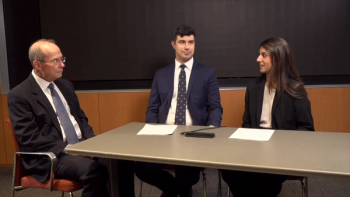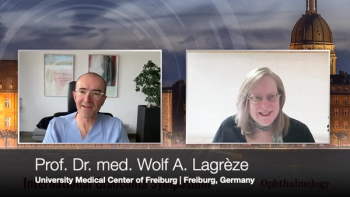
MIGS Surgery to Manage Non-Adherence in Open-Angle Glaucoma
Transcript:
Joseph F. Panarelli, MD: If a patient is knowingly non-adherent, what do you do? Do you switch medication classes? Do you suggest laser? Do you move to surgery earlier?
Sahar Bedrood, MD, PhD: If a patient is knowingly nonadherent, I will ask them why they’re not using the drop. If they say, “I forget,” I don’t think adding another drop is going to help them remember, quite frankly. So I will give them the options of SLT laser or I will give them a very open and frank discussion on the possibilities of surgery, either minimally invasive surgery (MIGS) or if they’re a little bit more advanced, we can do traditional trabeculectomy or tubes. And I give them all of these options.
I talk about surgery with patients because it perks their ears up and they say, “Oh, wait, I don’t want surgery.” And sometimes it reminds them that maybe it’s better for them to use the drops. Sometimes I will offer them surgery a little bit sooner because frankly, I want their pressure lower. And whether or not they remember or they don’t, I want their pressure lower and so I will offer them surgery a little bit sooner than someone who would be using the drops on a daily basis.
Dr. Panarelli: I’m curious what your thoughts are on what you now consider the maximum medical therapy? Traditionally for me when I finished Fellowship, maximally tolerated medical therapy often involve multiple classes of medicines, three or four classes and possibly even an oral agent. But I think in my hands nowadays, if I have a patient come see me, if they’re on two bottles and they’re not doing as well as they should, I’m starting to think about doing either laser treatment or possibly even surgical intervention, given the really nice safety benefits of a lot of these newer procedures that we have.
For me, right now maximally tolerated medical therapy often is two bottles. And, again, often that is the combination agent coupled with probably a prostaglandin analog. So three classes of medications in two bottles is usually where I’m starting to draw the limit. Because as you add more bottles, I think we decrease compliance. For a variety of reasons, we increase cost, we really make it more difficult for our patients to do what we’re asking them to do. Given that we have so many procedures that are available that do help lower pressure, while we’re not putting our patients at too much risk, I think I am moving more towards discussing surgery earlier in my treatment algorithm.
Dr. Bedrood: I completely agree with you. I don’t think that we need to wait three or four drops in order to do surgery. Sometimes I will. If the patient is really high risk for surgery, if they’re monocular, if they’re really hesitant, of course, I’ll put them on all the drops that they can tolerate. But, if they’re not any of those things and they’re open to doing something a little bit more, a tiny bit more invasive, then we will move forward with surgery. And I think in this day and age we do it a little bit sooner than we did 10 or 15 years ago.
Dr. Panarelli: That’s definitely becoming sort of a shift in the practice patterns in many glaucoma specialists across the country.
How are emerging pharmacotherapies addressing these issues?
Dr. Bedrood: It’s an exciting time. We have all kinds of new things coming on the horizon. The sustained release, the implants, the ocular inserts, all of these things that promise a way to deliver medications without having the patients do it. And having it in a very sustained, steady way is a really exciting part of our future in glaucoma. And I think that it will really help our patients in the long-term.
Newsletter
Don’t miss out—get Ophthalmology Times updates on the latest clinical advancements and expert interviews, straight to your inbox.





























